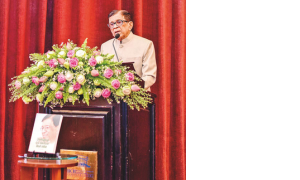
Sep 19 2024.
views 136From his adventurous childhood to his impactful career, the former minister’s autobiography evokes a vivid nostalgia akin to Martin Wickremasinghe’s Apegama and Madolduwa. Written in an engaging and affirming style, it offers an intimate look into his extraordinary journey and deep resonance with his community. The BMICH lit up with celebration as Dayaratne unveiled his autobiography. The event, artfully orchestrated by his devoted family, transcended a typical book launch, becoming a moving tribute to a life deeply lived and profoundly impactful.

The sheer grandeur of the volume, with its striking size and the heartfelt gesture of gifting it to attendees, left everyone in awe. The event transformed from a mere book launch into a deeply moving celebration of his extraordinary journey. Raised in Wethara, Colombo district, Dayaratne was influenced by his parents' generosity to religious and social causes. Their example of leadership shaped his values, and by his early teens, he was already taking on significant roles in organizing traditional temple rituals.
Boxing in the village school ring, exploring paddy fields, and daringly plunging into dangerous water holes shaped Dayaratne's unforgettable and perilous youth. These bold adventures forged his resilience and independence. Beloved as 'Sudu Mahatthaya,' he naturally became the captain of the local softball cricket team at ‘Kalaeli Ovita,’ showcasing his leadership. Dayaratne recounts his village escapades with the same passion as his time dancing and ice-skating in London during his undergraduate years at Brighton University, reflecting his versatile and genuine appreciation for every chapter of his journey.
Dayaratne’s earliest memory of the 1947 general election was marked by the contest in his Moratuwa electorate between millionaire Thomas Amarasooriya of the UNP and financially modest Chandrasiri of the LSSP. At just 10 years old, he assisted the UNP campaign in the area led by his father.
Despite Amarasooriya's wealth, the LSSP's victory highlighted the shifting dynamics of political influence. Six decades later, the political landscape had shifted, with money increasingly dominating. Despite 38 years of dedication and eight successive elections, Dayaratne found himself ensnared by a money-driven system. In an era often marred by scandal, Dayaratne’s unwavering integrity and principled leadership stand out.
Dayaratne openly acknowledges his struggles with studies at school. A dismissive comment from his teacher at Ananda—“You’ll never be an engineer”—ignited his determination to prove the teacher wrong. This mirrors JR Jayewardene’s experience, where he vowed to show his critic that he had made a mark on the world. Unlike Jayewardene, Dayaratne chose not to name the teacher.
Returning in April 1965, from Brighton University, where he graduated as an electrical engineer, Dayaratne joined the Gal Oya Development Board stationed in Ampara. He was later promoted to Electrical Engineer in the Department of Government Electrical Undertakings, which eventually became the Ceylon Electricity Board. For the young electrical engineer, starting a career in his field felt destined.
He spent a decade managing power generation and forty years working to uplift the underprivileged in the Digamadulla district. His long, arduous journeys became an integral part of his life. While working as an engineer, Dayaratne was elected President of the Mandala Mahaviharaya Society in Ampara. He led the restoration of the Cetiya within two years. Later, as a minister, he played a key role in constructing the Japanese Peace Pagoda.
In the 1970 General Election, Dayaratne stepped down from government service to contest the Ampara seat, a leftist stronghold, at the invitation of Prime Minister Dudley Senanayake, but was unsuccessful. In 1977, he accepted an invitation from J.R. Jayewardene and won, embarking on a career that greatly influenced the nation's development through his roles as Minister of Power and Energy, Mahaweli, Health, and State Resources. Vidyajothi K.K.Y.W. Perera, former Chairman of the CEB and Secretary to the Ministry of Power and Energy during his tenure, noted that Dayaratne’s experience as a Professional greatly aided his decision-making. He respected engineering and scientific recommendations and maintained the highest moral standards in procurement and contracts.
At nineteen, while awaiting his Technical College entrance exam results, Dayaratne took on a brief role as a Teacher at Galpihilla Estate School in Panvila. There, he forged deep, lasting friendships with his students, including the Samarasekara siblings, Cyril and Ariyawathie. His evening visits to their misty village, with views of the Knuckles Range, were marked by genuine empathy and solidarity with those from modest backgrounds.
During his London studies, Dayaratne kept in touch with the beloved "Galpihilla Dumbara Menike" and her brother through heartfelt letters. Despite mingling with London’s elite and learning refined English pronunciation from Sheila Mary Michel—a modest detail he later shared in his biography—his heart remained firmly anchored to his roots. The sophistication of his new surroundings did little to diminish his deep, unwavering connection to his origins. His skill captured Rudyard Kipling’s ideal: “If”, ‘You can walk with Kings—nor lose the common touch’.
This unique combination of elegance and humility highlighted the true essence of a man and a genuine leader. In a remarkable twist, the teacher became Minister of State Enterprises in 2008, leading the State Plantations Corporation. Fifty-four years after starting at the Galpihilla estate and school, both were now under his stewardship, completing a profound circle of destiny. Behind every journey was the steadfast support of his family. In his biography, he spoke fondly of his wife, Deepthika, whose quiet strength was crucial to his success, and cherished the support of his children—Asanga, Nilesha, and Rachitha— and their spouses, whose love and support were a constant source of strength.
Even after defeat nine years ago, enduring the 350-kilometre journey several times each month. Despite his advanced age and retirement, he remained resolute. “So highly regarded is this modest, gentle, amiable political engineer that he was selected by five executive presidents to serve as a responsible Minister,” noted Prof. Carlo Fonseka in the 35-year commemoration souvenir in 2012.
By K. K. S Perera
0 Comments